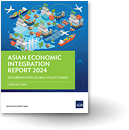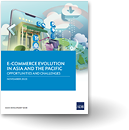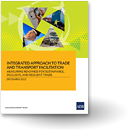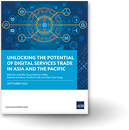Extraordinary policy responses are needed as pandemic’s economic impact is felt
How wisely governments cope with current and long-term economic challenges caused by COVID-19 will be an important defining factor for the prosperity of our and future generations.
Unlike the mainstream perspective of economists, global stocks seem to be pricing in rapid economic recovery in future. According to Bloomberg, the S&P 500 rose 20.0%, Dow Industrials 17.8%, Nasdaq 30.6%, Nikkei 17.8%, and the MSCI Emerging market index 17.3% respectively in the second quarter of 2020.
This represents a historical rebound after a significant market plunge in the first quarter. Market pessimists and short sellers should have been startled because we are not out of the woods yet with spikes in COVID-19 cases in many parts of the world and creeping concerns about second waves.
Global central banks’ swift policy responses along with broad fiscal expansionary measures must have buttressed the trailing market confidence and appeased investor sentiment effectively. For example, the US Fed’s support in the primary corporate bond market, along with its willingness to support even “fallen angels”—companies with a credit rating downgraded to junk bond level due to the pandemic—were unprecedented.
That was more than enough to quell the market turmoil although it could entail potential controversies about moral hazards which could be caused by investors’ taking excessive risks with the Fed’s expected backstop.
This might impart a premature signal that economic woes are already behind us. For all these positive signs, there are a couple of reasons that we still need to be cautious. First, the gains from the recent stock market rebound may have less impact on consumption recovery than anticipated. According to the Pew Research Center, as many as 52% of families in the US have either direct or indirect investments in the stock market. This average figure might skew the entire picture, however.
While 88% of families with more than $100,000 annual income own investments, only 19% of those with less than $35,000 do. Further, there are significant disparities among racial groups. This not only underpins growing income inequalities but curtails the consumption-boosting effect of capital gains, given households in the lowest quartile of income and liquid wealth empirically demonstrate much higher marginal propensity to consume than the higher quartile.
On the fiscal front, massive expenditure programs are being deployed to build a bridge to the other side of the economic trough, and rightly so. The US has engaged the largest fiscal packages at $6 trillion and Japan at $3 trillion so far. According to ADB’s COVID-19 policy database, the total amount announced by ADB’s developing members to combat the COVID-19 pandemic amounted to $3.3 trillion on June 29, 2020. And 49.3% of ADB’s developing members’ total package is allocated to direct support to household income and business revenue.
Although justified and even imperative, these aggressive measures are not without cost. The US Congressional Budget Office estimates that the coronavirus legislation has increased this year’s deficit from around $1 trillion to $3.7 trillion. The national debt is well over $26 trillion.
Taken together, it’s becoming paramount to think ahead on how to continue this longer-than- expected war against the economic crisis. This is particularly urgent in light of growing delinquency risks in both household and corporate sectors and persistent lackluster job market conditions.
While diverse policy recommendations are flying high, eventually governments are the ones to be held accountable for both short- and long-term repercussions of policies adopted.
Indiscriminate policy interventions and support packages were quite effective and timely during the economic and market turmoil at the height of the crisis. As the prospect of the fight against the pandemic and pursuant economic overhang prolongs, however, governments – particularly those in emerging markets – need to consider how to navigate this long-term challenge.
First, they need to check their war chest for this prolonged fight. Debt service suspension initiatives under the auspices of G20 will certainly help public-coffer-strained developing economies. Given its temporary forbearance nature, however, more sustainable resources should be explored.
With the option of tax increases remaining unwieldy at least in the near future, alternative ways to mobilize private capital for investment in infrastructure, and corporate and financial debt financing and restructuring could lessen the fiscal burden. Privatization of some state-owned enterprises from the perspective of industrial reform could also be considered in this regard. Multilateral institutions’ role in extending emergency assistance for health and economic recovery cannot be overstated.
Second, income and credit support for households and firms should be targeted at the most vulnerable segment of the society and industry to maximize the efficacy of government support and value for money. Under a universal income subsidy, for example, rich households are not easily tempted to consume and are known to be less responsive to non-temporary income shock than low income households. Even if a time-bond voucher scheme is used, the rich can easily substitute this consumption with other types of expenditure. So, the expected trickledown effect could be constrained.
Third, emerging economies in particular need to fend off the temptation to resort to money printing to fund the necessary resources beyond short-term, immediate needs. The US, owning the world reserve currency, and Japan, with a safe haven currency to a certain extent, could be immune from the risks associated with ballooning fiscal deficit through monetization.
While the US Fed’s balance sheet expansion can bring about changes in the composition of asset holdings among economic agents, it may not cause runaway credit expansion as the Fed can influence bank reserves through short-term interest rates. Unfortunately, however, emerging economies cannot enjoy such a luxury due to various economic and credibility constraints and underdeveloped financial markets.
While diverse policy recommendations are flying high, ultimately governments are the ones held accountable for both short- and long-term repercussions of policies adopted. Extraordinary circumstances require extraordinary responses.
Nevertheless, how wisely governments cope with current long-term economic challenges will be a more important defining factor for the prosperity of our and future generations.
Original article was published at the ADB Blog and duplicated here with permission from the author. *




